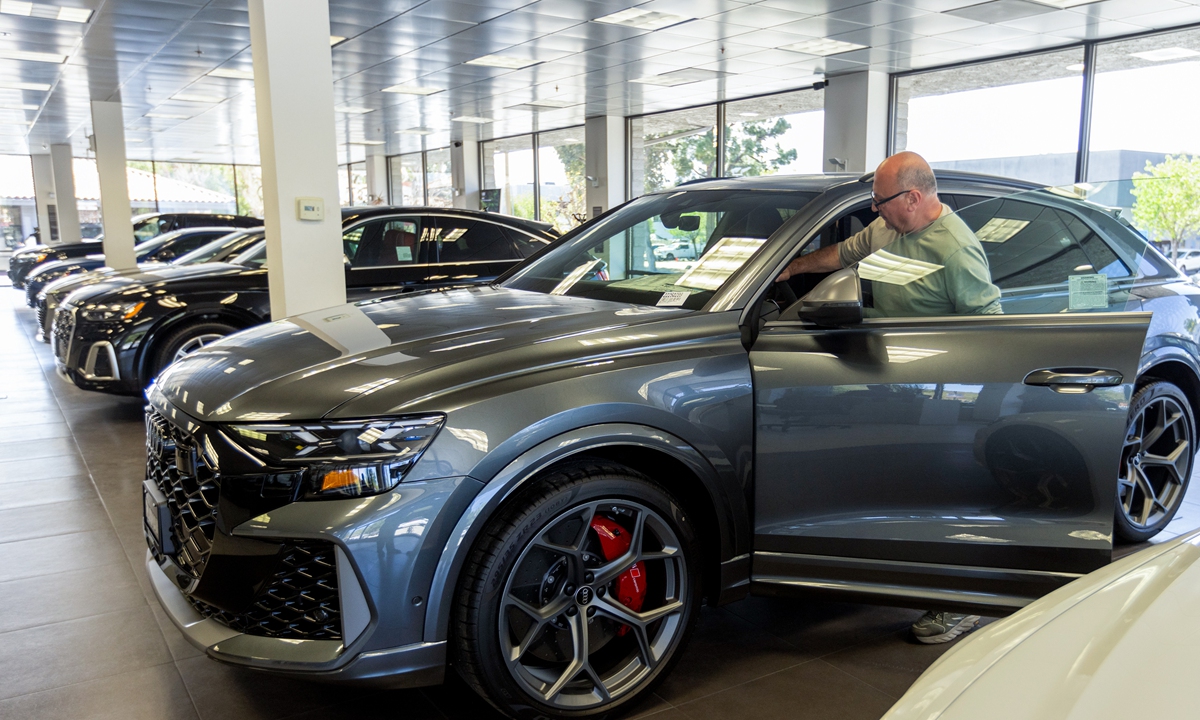
A customer looks at a new Audi RSQ8 vehicle at an Audi dealership in Thousand Oaks, California, the US, on April 11, 2025.?The Audi Q5, Audi's top-selling vehicle in the US, is being hit with three US tariffs totaling at least 52.5 percent, making it unsellable in the country. Photo: VCG
When a new car rolls off an assembly line in Detroit, the US, thousands of its components may originate from countries like Canada, Mexico and China. After decades under the North American Free Trade Agreement and the US-Mexico-Canada Agreement, the auto industries of the US, Canada and Mexico have developed a tightly interdependent supply chain.
According to the US Auto Care Association, the US automotive aftermarket industry imported more than half of its automotive parts from Mexico and Canada in 2023, with 46.6 percent of parts coming from Mexico, 11.6 percent from Canada and 8.5 percent from China.
Around 70 percent of the 5.3 million vehicles produced annually in Canada and Mexico are exported to the US.
This globalized production model was once a major driver of competitiveness for the US auto industry. But now, a wave of unilateral tariffs from the current US administration presents the industry with an unprecedented challenge. While these policies are intended to protect US' car manufacturing, they may end up doing the opposite - raising costs, suppressing demand and fueling economic uncertainty.
The US auto industry relies heavily on an integrated North American supply chain, with parts and finished vehicles often crossing borders multiple times during the production process. The newly imposed tariffs have disrupted this system, driving up manufacturing costs that are likely to be passed on to US businesses and consumers.
As it stands, a 25 percent tariff on vehicle imports could lead to price increases for several of America's top-selling trucks, such as the Chevrolet Silverado and Silverado HD, GMC Sierra, Ford Maverick, and Ram 2500, 3500, 4500, and 5500, all of which are produced in Canada or Mexico.
Tariff hikes are making it even harder for many US consumers to purchase a car. In an interview with Fox Business, David Kelleher, a car dealership owner in Glen Mills, Pennsylvania, said that the effects of Trump's reciprocal tariffs had already been "dramatic," leading to at least one sale falling through.
"I had sold to a customer, $80,000 truck. It's $100,000 now," Kelleher said. "So, he's not going to buy the truck. It's going to sit on my lot. You know the higher interest rates were paying right now for the floor plan, and nobody's going to buy the truck because it just had a $20,000 price increase."
The implications for affordability are at the forefront of AIADA's concerns. President and CEO of American International Automobile Dealers Association Cody Lusk cited a dealer with 10 stores who reported sluggish January and February sales, attributing the slowdown to a combination of affordability challenges and economic uncertainty.
Bill Hanvey, president and CEO of the Auto Care Association, also stressed the serious impact that the proposed tariffs would have on the automotive aftermarket industry, US consumers and businesses.
"We understand the importance of national security and the need to address critical challenges, but these tariffs will have a direct and negative impact on American businesses and consumers," said Hanvey.
Ford Motor Co CEO Jim Farley warned recently that if the tariffs imposed on Mexico and Canada, it would wipe out billions of dollars in profits and result in significant US job losses.
The 25 percent tariffs on imported vehicles in the US took effect on April 3, with tariffs on auto parts set to follow in a month, according to the White House. On Monday, US President Donald Trump suggested he might temporarily exempt the auto industry from additional tariffs to allow carmakers time to restructure their complex supply chains, as reported by CBS. In remarks to reporters in the Oval Office, Trump stated that automakers "need a little bit of time" to relocate production from Canada, Mexico and other locations to the US. The US administration encouraged automakers to "start investing, start moving and shift production here to the US."
However, as John Paul MacDuffie, a professor of management at the University of Pennsylvania, noted that it's just not that simple. "Automakers will be hit differently based on exactly where their supply chain is," he said.
The Trump administration aims to bring manufacturers back to the US through high tariffs, but building global supply chains is not something that happens overnight. What the US auto industry needs is not protectionist trade barriers, but a more competitive production environment, investments in advanced technologies, and stable market expectations.
Protectionism acts like a mirror. It reflects others but also reflects on oneself. Perhaps the current US government should learn more from the lessons of its own history. Throughout the past, there have been numerous instances of high tariff policies, such as the Smoot-Hawley Tariff Act signed in 1930, which triggered a global trade war and worsened the Great Depression. Similar efforts in the 1970s and 1980s within the auto sector also failed to produce the intended outcomes.
Today's US auto industry is highly globalized, and any protectionist measures could set off a chain reaction, putting the entire industry at risk of a new crisis. The industry is rapidly shifting toward electrification and intelligent technology, but trade protectionism offers no real support for this transition.
In light of the current situation, the US government should reconsider its trade policies. It should focus on fostering technological innovation, improving the business environment and strengthening open international cooperation to drive industry growth, rather than trying to reverse the trend of global economic integration through tariff barriers. Otherwise, the US auto industry may end up undermining itself in the face of this sweeping wave of protectionism.
The author is the secretary general of the China Passenger Car Association.




